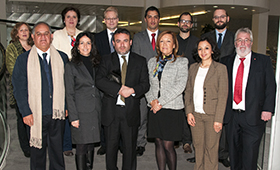Chilean reform of education and training - a challenge for the education and training system
Federal Institute for Vocational Education and Training (BIBB) and the Chilean Ministry for Education (MINEDUC) adopt an agenda for collaboration over the coming two years. The BIBB will advise and support Chile in its training reform.

The current reform of education and training in Chile is creating political pressure. “Chile not only needs companies to get involved in vocational education and training, but, at a fundamental level, there is a need for a legal framework for the entire system of education and training which legally defines the goals, key players and the system mandate”. This was how participants from the Chilean Ministry for Education (MINEDUC) described their country's current situation while attending a joint planning workshop at the BIBB in November 2015.

The aim is that, in future, vocational education and training in Chile will be more focussed on practice and will take the employment opportunities and the potential of a region into account. As part of this, companies, in particular, are being asked to more readily engage with technical vocational education and training.
The BIBB will provide the MINEDUC with advice and support for the reform of education and training. The main emphasis of the advice is in the area of vocational education and training. The following areas of consultation have been determined in a joint agenda for 2016 and 2017:
- Management of vocational education and training including the definition of a legal framework for dual vocational education and training as well as organisation at an institutional level of the roles and mandates of the key players
- Learning location cooperation agreements including advice for setting up new vocational education and training centres (CFTs) as part of the education and training reform
- Standards development, including the development of an examination system based on the German model
Over the course of the joint planning workshops, the BIBB and the MINEDUC also agreed to the implementation of pilot projects as part of which there would be close collaboration between companies, vocational education and training centres and the state. This also involved detailed discussion of bilateral pilot projects to promote dual education and training. The aim is that these projects will now be developed in a subsequent step by the Chileans and then standardised and put into operation by the BIBB and the German-Chilean Chamber of Industry and Commerce.
Besides the planning workshop, the programme for the delegation visit also included an exchange of information with the project leaders of the BIBB and representatives of the Federation of German trade unions, the coordinating association of German industry for vocational education and from iMOVE.
The delegation consisted of experts from the MINEDUC, the regional department for education and training in the Tarapacá region, key vocational education and training centres, the industrial association ASIVA (Asociación de Industriales de Valparaíso), the German-Chilean Chamber of Industry and Commerce and the Chilean Embassy in Berlin.
Further centres for technical education and training in Chile

Back in August 2015, the Chilean President, Michelle Bachelet had declared at celebrations marking the day of vocational education and training, that “concrete steps would be taken to afford vocational education and training the prominent position it deserves”.
As part of the VET reform, the aim is that at least one public and state-run centre for technical vocational education and training (Centros de Formación Técnica – CFT) should be created in each of Chile's 15 regions in addition to those which already exist. This aims to guarantee that “nobody who wants to continue training should be dependent on family resources”.
The intention is that these new CFTs will be part of a regional development strategy. This means that occupations delivered at a CET should be linked to the employment opportunities and the potential of the region. New education and training plans and programmes are also scheduled for implementation from 2016 onwards.
The BIBB and the Chilean ministry for education have been collaborating with each other since 2011 on the basis of a cooperation agreement relating to issues in vocational education and training.